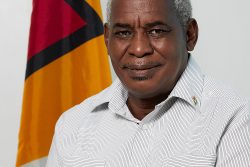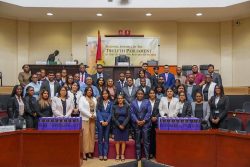Dear Editor,
Since we launched our disclosure on campaign financing, the result has been primarily positive, while some persons have asked why we didn’t just disclose the names. The reason is that we didn’t have permission to from everyone, but we did have the authorization from some people.
Shortly after we launched, a highly respected Guyanese citizen who knew our Presidential Candidate, Ms. Lam personally donated $200,000 to the campaign. He chose anonymity because he preferred not to have the backlash associated with showing political support outside of the major players.
The first donor who had no qualms about publicly releasing their identity was Chris Ram (Donor 3) who made his commitment after TCI made an appearance on his television show. Mr. Ram has donated at the very least the same amount to several other new parties, something they can verify if they wish.
A donation of US$500 ($105,000) from Mr. Rex Paul, a Guyanese-born US citizen, came after a meeting in Washington, DC and he is recorded in our donor database as Donor 17.
Donor 6 made two contributions of US$500 each, but prefers to remain anonymous since she has associations with and has made contributions to another political party, while supporting us in principle.
Our most generous donor to date is Dr. Mahendra Samaru, a former President’s College schoolmate of TCI executive, Ruel Johnson who contacted him and offered support shortly after the launch. As of this correspondence, Dr. Samaru’s contributions amount to US $3,500 US or $717,500. This is not shadow money or special interest money, but someone from Guyana with a genuine interest in Guyana investing in the political machinery. For verification, Dr. Samaru’s information can be found at www.weillcornel.org/msamaru, where he is listed as a highly qualified Assistant Professor of Clinical Anesthesiology at the Weill Cornell Medical College, Cornell University.
We of course recognize that there other ways to donate to a campaign other than cash. That is why we have also costed in-kind contributions as accurately as possible and distinguished them from cash contributions. For example, with Donor 2, an overseas-based Guyanese who has been very generous to the Coalition in the past, we separated the provision of a vehicle and driver to meet with citizens in Region 2 and put a cost of $40,000 on it, which is the cost we paid in cash for the same services later on; he sent us US$500, which is recorded as $105,000. His total campaign contribution is therefore recorded as $145,000. At a US meeting, food was provided and we asked the host the cost of the food and included that figure under Donor 19, $21,000 or US$100.
The need for campaign finance reform has always been an urgent one. The quid pro quo of shadow money and special interest campaign financing is at the root of corruption in this country. When government uses millions of taxpayer dollars to rent a bond hastily acquired and for no clear purpose from a ‘party financier’, that is the spectre of campaign finance related corruption showing itself. When construction companies that finance political campaigns to the tune of millions are being awarded public work contracts worth billions under questionable public tendering rules, that is campaign finance related corruption. When a branding company that provided ‘free’ billboards to a political campaign is given the lion’s share of billboard and branding contracts under a new government, we see the spectre of corruption. And then of course there is the issue of abuse of state resources for campaigning, something we seem to have come full Animal Farm on.
Now, the need for reform is even more urgent, particularly considering the complexity of how capital moves in an oil and gas economy and the impact of that capital on political decision-making. One emerging party, for example, has been against renegotiation of the oil contract with Exxon, arguing that we should accept it and guard against exploitative arrangements with future contracts. When the Department of Energy recently revealed that it had recently hired a US firm to do what should have been done years ago, revise the decades-old Petroleum (Exploration and Production) Act, it was casually revealed that the local firm the US company had partnered with is owned by the Presidential Candidate of the very new party that has – along with the PPP and APNU+AFC – refused to consider contract renegotiation, even in the wake of the damning Global Witness report.
In recognition of this complexity, we will not simply submit our financial records to GECOM in keeping with the Representation of the People Act, but we will be working with an independent agency to produce a post-elections report on campaign financing. It should be noted that among our executive is Ms. Cerise Taylor, a lawyer and certified anti-money laundering expert.
We repeat our challenge to all parties, new and old, to simply disclose details on your campaign finances before elections and commit to following the law and disclosing your finances to GECOM after elections, as well as making them a matter of public record.
Whether you are a new player or an old one, you cannot claim to be speaking about public accountability, or decency and integrity, or upsetting the status quo and doing things differently if it is that you refuse to voluntarily disclose any information on campaign income and expenditure. The law on campaign finance accountability is one thing, but cultivating a culture of accountability is what is critical for meaningful transformative change.
Yours faithfully,
Shazaam Ally
Founding and Executive Member
The Citizenship Initiative










